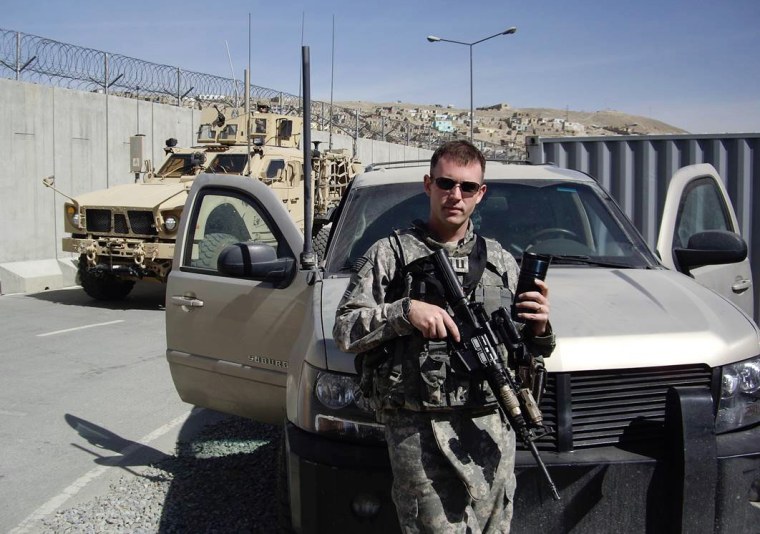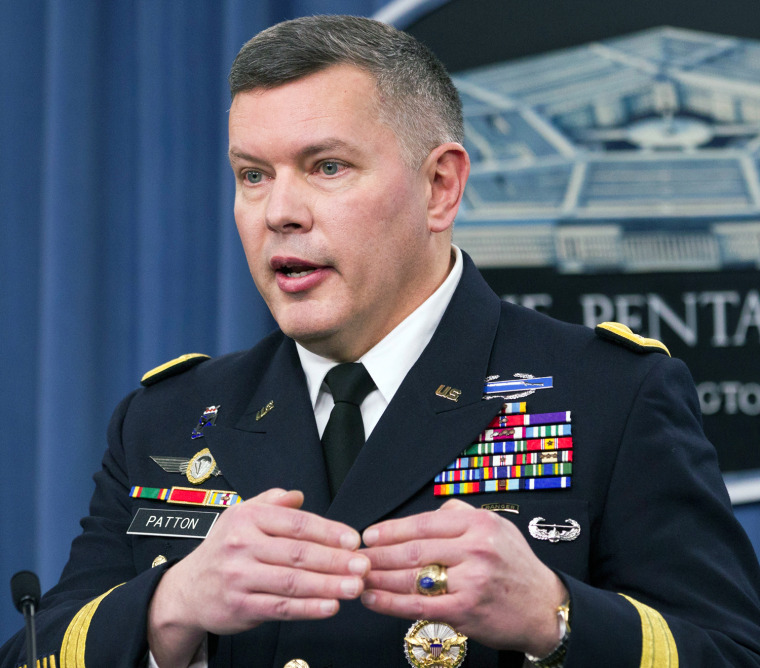The Army general in charge of preventing sexual abuse throughout the U.S. armed forces is facing new accusations that he personally interfered with an internal Pentagon investigation into allegations of horrific conditions at a U.S.-funded hospital in Afghanistan.
Three whistleblowers tell NBC News that Army Maj. Gen. Gary Patton blocked a subordinate from briefing the Pentagon inspector general about claims of mistreatment of patients and rampant corruption at the U.S.-funded Dawood National Military Hospital in Afghanistan.
The Dawood hospital, where wounded Afghan soldiers were treated, received national attention in 2011 after the Wall Street Journal reported on abuses at the facility and gruesome photos surfaced showing patients starving and suffering from maggot infested open wounds. One U.S. legal adviser in Afghanistan later told Congress that conditions at the hospital – funded with more than $200 million from U.S. taxpayers -- were “Auschwitz-like.”
The allegations, along with charges that pharmaceuticals were being diverted by corrupt Afghan officers, triggered two hearings by a House investigations subcommittee last year that focused on whistleblower claims that senior U.S. military officers -- including Patton -- sought to cover up the abuses to avoid undercutting President Barack Obama’s Afghanistan strategy.
Speaking publicly for the first time, Navy Lt. Commander Jeremy Young told NBC News that Patton cut off him off and upbraided him when he tried to brief investigators from the Defense Department’s inspector general’s office about the maltreatment of patients -- including one whose bones had been misaligned through a botched surgery.
“Gen. Patton gets me cornered in the hallway, he puts his finger in my chest and he says, ‘You need to stay in your f------ lane, lieutenant,” Young said, describing what took place during a February 2011 tour of the hospital by a team from the Inspector General’s Office. “If you don’t know about bones, you don’t talk about bones.”
Young, a nurse anesthetist, said he replied: “But sir, I’m the only one who knows about bones.” Patton then repeated himself, Young said. “You are to stay in your f------ lane.” Patton’s statements led him to cancel the briefing because, Young said, “It was very clear there would be repercussions.”
Two other service members at the hospital that day corroborated portions of Young’s account. One of them, Army Col. Mark Fassl told NBC News that he was standing outside a crowded hospital room that day listening while Young was briefing the inspector general’s team, showing them the badly misaligned bones of a suffering Afghan soldier.

“General Patton was beside himself,” said Fassl. “He comes out and said, ‘We need to stop him talking to the inspector general. Lt. Young cannot talk about this.” Fassl, who was then the command inspector general for the NATO training mission, is now the director of the U.S. Army Joint Support Team at the U.S. Air Force Special Operations Command at Hurburt Field, Fla.
At the time, Patton was deputy commander of the NATO training mission in Afghanistan, overseeing training of the Afghan Army and strengthening the country’s medical system, including the Dawood hospital. In July 2012, Patton took over one of the Pentagon’s most high profile and sensitive positions — director of SAPRO, the Sexual Assault Prevention and Response Office, whose core mission includes encouraging service members to report assaults. He is now facing potential disciplinary action over a finding by the inspector general’s inquiry into the Dawood facility.
(New York Democratic Sen. Kirsten Gillibrand, who has sharply criticized the Pentagon’s handling of sexual assault cases, said Friday: “If these claims are substantiated, General Patton should be relieved of his post.” Also citing the accounts of Young and Fassl, the Project on Government Oversight (POGO) said in a letter to Defense Secretary Chuck Hagel that “to leave Patton in place would send the wrong signal at this critical time.”)
Patton did not respond to request for comment from NBC News about Young’s account. His spokeswoman, Army Lt. Col. Wilkinson, said in an emailed statement: "These allegations were reviewed as part of DoD IG investigation. The results of the DoD IG investigation have not been made public. Maj. Gen. Patton's case is with the Secretary of the Army for final disposition."
In congressional testimony last year, Patton described his efforts to improve conditions at the scandal-ridden Dawood hospital as “gut wrenching,” and adamantly denied that he blocked any inquiries into the maltreatment of patients.
“I never directed subordinates, nor received orders from superiors that a request for a DOD IG visit be either delayed, impeded or avoided for any reasons, to include political reasons,” Patton testified.
While the inspector general says conditions at the hospital have improved, the fallout is still roiling the Pentagon. The recent inspector general report, a copy of which was obtained by NBC News, concluded that Patton improperly restricted an inquiry into abuses at the hospital. (The report’s findings were first reported by Bloomberg News.)
Specifically, Patton was found to have forwarded an email containing orders from his superior officer, Army Lt. Gen. William Caldwell, stating that reporting to outside Pentagon investigators about conditions at the hospital “has gotten out of control” and that “absolutely nothing leaves our headquarters in response to anyone on this” without Patton’s or Caldwell’s approval. Fassl, who had received a copy of the forwarded email, filed a formal complaint with the inspector general, triggering the investigation.
The inspector general found that both Patton and Caldwell violated the Military Whistleblower Protection Act, which prohibits restricting service members from communicating with the inspector general or members of Congress. The report states that Patton “was uniquely positioned to question the restrictive orders, or at least ask for clarification. Not only he did not question LTG Caldwell’s orders, he forwarded them” to one of his subordinates, it said.
Both Patton and Caldwell have disputed the findings and said they were only trying to coordinate official responses from their command to the inspector general — not prevent service members as individuals from reporting problems at the hospital.

The inspector general’s findings are being taken seriously inside the Pentagon. Secretary of the Army John M. McHugh wrote in a letter to Sen. Charles Grassley, R-Iowa, that Caldwell “chose to retire … knowing that these substantiated allegations would prevent future promotion.” Patton’s case “is still pending final action,” McHugh wrote. It is not clear when the decision will be handed down.
A Defense Department official familiar with the case defended Patton, saying he was at most guilty of a relatively minor infraction. "After an intensive 18-month-long investigative process that included multiple interviews and hundreds of pages of documents, the only substantiated claim against Maj. Gen Patton was that he restricted communication with the DoD IG by forwarding one email from LTG Caldwell," the official said in an email.
A highly decorated, 32-year Army veteran, Patton served as a top commander in Iraq and Afghanistan and later as a principal director of the team charged with implementing repeal of the Defense Department’s “Don’t Ask, Don’t Tell” policy.
Young, the Navy lieutenant who alleges he was cut off by Patton during his briefing of Pentagon investigators, said he later reported the encounter to the inspector general and the State Department, but never filed a formal complaint. There is no direct reference to the encounter in the inspector general’s report, although it does refer to the Feb. 2011 visit to the hospital by the inspector general’s team and Patton’s role: “MG Patton’s personal presence during the most critical part of the inspection underscored the message that no information that was not personally cleared by MG Patton was to leave the command.” (A spokeswoman for the Defense Department inspector general’s office declined comment.)
In addition to Fassl, another service member supported portions of Young’s version of events: Dianne Capri, an Army nurse also assigned to the hospital, said she was immediately informed that the visiting team from the inspector general’s office would not be continuing their tour of the hospital because of the confrontation between Patton and Young.
“Nobody was more knowledgeable about that hospital” than Young, said Capri. “He wanted to take the touring party to see a couple of patients and that was quashed. … Word of what happened spread like wildfire. They (commanding officers) didn’t want them to see people starving to death or lying in their own excrement.”
More from NBC News Investigations: